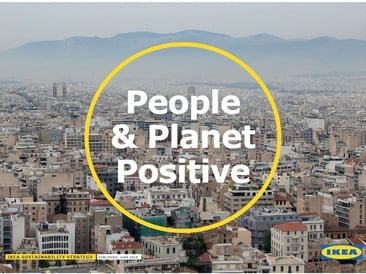- Dec 28, 2020
- 30 min read
2020 Wrapped: 5 Companies with Diverse Sustainability Strategies
Updated: Dec 29, 2020

Corporations amped up their energy and climate targets in 2020
Where to begin with 2020? It has been an unprecedented and difficult year with our global community facing the most unique challenges. This disruption has given us a distinct opportunity to reflect on the impact and progress regarding people and the environment. For example, buildings were left unoccupied by 90% but only showed a corresponding 30% decrease in energy usage. Vacant building spaces in our towns and cities revealed an unparalleled insight into how much work there is still left to do for building energy efficiency performance.
This revelation is not going unnoticed. We have recently passed the 5th anniversary of signing the Paris Agreement, a historical international treaty with the goal of limiting warming below 2°C, preferably a hard stop at 1.5°C. To achieve this, IPCC urges GHG emissions must halve by 2030 and drop to net-zero by 2050. Both targets are just around the corner. There is no better time than the present (yes, even in a pandemic) to act on reducing our energy consumption and carbon footprint. Key players to achieving these goals are corporations. According to the 2017 CDP Carbon Majors Report, 100 energy companies are responsible for 71% of all industrial emissions.
New Era of Sustainability Goals
The answer to tackling all these sustainability goals? The main go-to comprehensive methods are climate pledges and sustainability commitments. Companies and organizations are amping up the number and intensity of climate goals, from adopting energy efficiency measures, sourcing electricity from clean energy, and increasing community partnerships, all to target carbon neutrality.
Although COVID-19 has presented urgent challenges we are still battling, companies that are able to participate in voluntary emission cuts should not hold back. Specifically, this year saw a notable number of companies and organizations step up to lead the way with ambitious, measurable, and transparent sustainability and energy targets. Using global targets as guidance, the same corporations setting clear sustainability goals also benefit from tangible operational improvements.

Specifically, Science-Based Target initiative (SBTi) is an encouraged method of target setting. SBTi is leading the way in helping companies and cities make thoughtful commitments by breaking down their ultimate goals into multiple smaller targets. This process empowers continued commitment through routine target reporting. This year, only 5 years after being launched, SBTi reached a milestone, with over 1,000 companies worldwide committing to set targets based on science and in alignment with the Paris Agreement goal. Just looking at the number of companies listed as committed in the SBTi database is inspiring.
Where are we now?
Across all sectors, companies are paving the way to quickly transition to a carbon-free future. A notable few are employing diverse strategies to tackle their internal operations that are critical to help keep warming at 1.5°C.
1. BlackRock Kicks off the Year Sustainably
American global investment and asset management giant BlackRock kicked the year off with CEO Larry Fink’s unanticipated but influential letter to chief executives, announcing a paradigm shift in priorities for the firm. The direction BlackRock is taking is summarized in the most popular quote of the letter: “Awareness is rapidly changing, and I believe we are on the edge of a fundamental reshaping of finance”. Taking a clear stance on the prospect that the finance world is not immune to the climate change risks and fiduciaries, including BlackRock, have a critical role in mitigating those risks.

BlackRock’s goal to expand their offering of sustainable investing and create more resilient and transparent portfolios will likely become a trend and eventually an industry norm. However, the exact plan on how to exit from the deep-rooted connections with fossil fuel investments is unclear. Now, it’s just a matter of keeping up with the quarterly reports and tracking whether BlackRock’s sustainability drive is truly progressing towards disincentivizing carbon-based investments.
2. Big Strides for Amazon's Sustainability Commitments
It has been a year of contrast for Amazon. They are resisting to raising Hazard Pay for warehouse and delivery workers (leading to boycotting) while also making huge strides towards their energy and climate targets. There’s considerable work on ensuring consistent equitable compensation for these essential workers that have been able to maintain our comfort during the pandemic. On the energy side however, Amazon has made undeniable progress towards zero-carbon targets.
Co-founding their very own The Climate Pledge with Global Optimism in 2019, Amazon set the ambitious initiative to reach net-zero carbon emissions from operations by 2040 or earlier, 10 years earlier than required by the Paris Agreement. Just this December, 13 more companies joined The Climate Pledge, totaling 31 companies striving for carbon neutrality by 2040. The Pledge requires following a simple but critical three-step process of regular reporting, eliminating carbon, and obtaining credible offsets.

The impressive added capacity of clean energy allows Amazon to reach their 100% renewable energy sourcing goals by 2025 instead of 2030. There’s also a focused effort to include underrepresented communities in the renewable energy industry by employing women and BIPOC owned clean energy businesses in the projects.
These efforts are unquestionable strides to necessary climate action. It will be encouraging to see which small businesses Amazon will empower and highlight on their journey to diverse, equitable, and inclusive renewable industry.
3. JetBlue Taking Flight Towards to a Carbon-Free Future
JetBlue Airways has really elevated it’s standing in the airline community by deploying strong sustainability projects and initiatives in the last decade. This is no small feat given the particularly challenging context that airline companies are known to emit quite a bit of greenhouse gases directly into the atmosphere. Globally, aviation emits 915 million metric tons of CO2 or 2.4% of total global CO2 emissions in 2018.
Although this seems like a relatively small amount, if commercial aviation were a country it would rank sixth in world emitters. Commercial flights are only expected to increase once it’s safe to travel again. JetBlue understands its role and responsibility in the climate fight and is leading the way with green efforts on all fronts.

In the past decade, JetBlue has built a 24,000 SQFT rooftop farm at the JFK Airport T5 Terminal, recycled old uniforms into travel bags, released sustainability reports and bought carbon offsets. This year JetBlue announced that it is the first US airline to reach carbon neutrality on all domestic services of an estimated 7-8 million metric tons of CO2. To further their commitments on batting climate change, JetBlue also joined Amazon’s “The Climate Pledge” to measure GHG emissions, decarbonize operations, and neutralize remaining emissions.
As JetBlue continues to blaze the trail for sustainability in aviation. I look forward to what innovative strategies they embrace next.
4. IKEA Building on Circular Economy Principles
IKEA took a pilot sustainability program in 27 countries and expanded to a global buyback program of tremendous scale. This was timely announcement right before Black Friday in order to raise awareness on the default trend of overconsumption and buying what we don’t need, especially in sight of appealing discounts. Retailers against the Black Friday phenomenon are gaining traction. One group of sellers are joining with the French non-profit Make Friday Green Again, a pledge to not participate in Black Friday deals that go against their sustainability commitments.
IKEA’s program is a direct approach to combating climate change through reducing the need to source new materials for manufacturing. With this program, IKEA is emphasizing reusing materials and products rather than buying new ones. Employing this circular approach, they will be able to reuse materials otherwise sent to landfill while making it accessible for past customers to participate in the program.

5. Eileen Fisher Threading Sustainability in every Fiber of the Fashion Industry
Renowned luxury fashion sustainability leader has not only committed to the SBTi in 2017, but set official targets in March to reduce their GHG emissions. Sustainability is in Eileen Fisher’s fiber (the company’s and their clothing) as evidenced by the use of organic and responsibly grown materials, the recycling of worn garments to create new textiles, and the emphasis on equitable labor practices in their factories. Beyond its operations, Eileen Fisher is giving a hand in advocacy and accelerating the fashion industry’s role in the climate battle.

Over the past few years, the fashion industry has been under heat due to its environmentally intensive, polluting, and wasteful production. It’s estimated that textile production releases total greenhouse gas emissions of 1.2 billion metric tonnes annually, more than those of all international flights and maritime shipping combined. Not only has Eileen Fisher embedded sustainability in the vision of the brand, but has raised the bar with increasing their environmental partnerships, frontline policy advocacy, and direct reduction of GHG emissions from operations.
Keeping up the Momentum in 2021
Corporate climate pledges have set the tone for the upcoming years, fueled by public demand for stronger climate action. Although these announcements are worthy of recognition, it is important to hold these companies accountable and demand transparency on their goals. Pledges are just that, pledges, until they become attainable goals with detailed and transparent plans. Many companies have committed to net zero goals, energy reductions, and climate pledges, however only 11% have actually carved out dedicated targets to keep them on track for their milestones and goals
 The good news is that we are finally seeing a consistent shift in narrative from individual environmental action (which is definitely encouraged) to include the discussion of the role and responsibilities of corporations. As they account for the larger portion of emissions, it should be expected to address their carbon footprint.
The good news is that we are finally seeing a consistent shift in narrative from individual environmental action (which is definitely encouraged) to include the discussion of the role and responsibilities of corporations. As they account for the larger portion of emissions, it should be expected to address their carbon footprint.
Reducing emissions and energy consumption are definitely a critical focus to achieving international targets. However, it’s also important to keep a close eye on social commitments as well. Climate change disproportionately effects marginalized and vulnerable communities mostly due to inequitable systematic social and economic structures. These communities and workers are the backbone of our economies. And as we’ve seen with the pandemic, people are the core of our systems and prioritizing them will drive sustainability.
Not only will everyone reap the benefits of a low carbon future, but companies advancing net-zero businesses and operations have a higher competitive edge in the long-term. Ensuring a healthy, equitable, productive, and sustainable future should be a global priority. And we can only do it with collaboration on all fronts: from cities, governments, to companies, all working synergistically.
Celine Damide is a Clean Energy Data Analyst at Brightcore. She contributes to our sustainability blog, where we share insights on clean energy solutions for your business or institution, whether you have a fully formed corporate social responsibility plan or you are just starting to consider a renewable energy or energy efficiency strategy. Follow Celine and Brightcore Energy on LinkedIn and Twitter (@BCEnergy).


-3.png)


